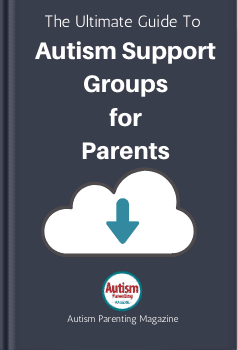For many autistic individuals, masking is a strategy used to avoid feeling out of place or facing judgment from others. However, while it may help in the short term, it often leads to significant emotional and mental strain in the long run.
Over time, the constant effort to hide or change one’s true self can result in exhaustion, anxiety, and a sense of disconnection from others. It is important to recognize the effects of masking so that autistic individuals can receive the support they need to express themselves authentically and feel accepted in their environments.

Download your FREE guide on
Autism Support Groups for Parents
What is masking in autism?
Masking refers to the efforts of individuals on the spectrum to conceal behaviors associated with autism to avoid being perceived as autistic. They may try to reduce their stimming behaviors or hide them from others.
In an attempt to “fit in” with their peers, they might mimic the behaviors of those around them or memorize conversational scripts to use in social interactions. The primary goal of masking is often to appear non-autistic and adapt to societal expectations.
The short-term effects of masking in autism
While some individuals with autism may engage in masking, the effort to consistently conceal their autistic traits can be extremely exhausting. This constant suppression of natural behaviors often leads to significant physical and emotional exhaustion.
Such daily exhaustion can lead to more stress for the autistic child, as well as depression, overwhelming anxiety, or other mental health symptoms.
The short-term effects of masking in autism
Concealing or attempting to conceal their autism can cause a child to deny their overall identity. Autism is a lifetime diagnosis, and concealing it can lead to other mental health-related conditions.
Autistic children need to embrace their diagnosis and understand how it makes them unique. It can become unhealthy for an individual to direct all their energy towards attempting to deny who they are to others.

Your child may mask in response to bullying at school or after hearing negative remarks about their stimming or verbal responses.
Some children will also involve themselves in masking their autism under the assumption that they feel that it makes their parents or other family members feel “sad.”
Long-term effects of masking autism
All individuals with autism and those with any kind of disability will eventually need to learn how to “self-advocate.” Individuals involved in “masking” their autism may miss out on developing the essential life skill of self-advocacy.
You can’t advocate for yourself in a school system or a place of employment if you are unwilling to embrace your disability. Individuals masking their autism may become unaware of the necessary accommodations that they require in life to continue being successful.
Children who recognize their autism-related traits may be surprised to find non-autistic individuals who embrace and accept them.
While this acceptance may not be universal, children can begin to see that a supportive group of people values and appreciates them for their individual qualities.
Many parents are “impressed” with their children’s ability to “mask” their autism. They believe that because “masking” involves a higher level of thinking skills, somehow, this means something “positive” for their child.
Parents may not realize that children with level 1 autism who engage in “masking” face unique risks. Although these children typically receive some level of support for their autism, masking their behaviors can prevent them from accessing the care or therapy they genuinely need.
Some autistic children who engage in “masking” may avoid certain settings, fearing they’ll be labeled as “autistic” or “special education.” These settings can include schools, hospitals, churches, or counseling offices.
Avoiding them may lead to missed opportunities for valuable professional support and guidance.
Coping strategies for reducing autism masking
Individuals engaging in “masking” may benefit from participating in a social skills group. These groups are generally small, with children approximately the same age.
Social skills groups for autistic children often work on developing conversational skills, maintaining appropriate eye contact, and turn-taking behaviors. They often assist children in celebrating their autism and differences.
Such groups can help your child who is engaging in “masking” recognize that some of the behaviors they are trying to hide are common among their autistic peers. This understanding can provide reassurance and reduce the pressure to conceal their traits.
Encourage your autistic child to connect with other autistic children at school and in the community. This interaction can help them develop a healthy sense of self-identity and understand that autism manifests differently in every individual.
It will help them become aware that others around them also have autism. Empathy is a skill with which autistic children often struggle.
How to support your autistic loved one’s self-expression
Can parents tell if their child is engaging in “masking”? Signs may include repetitive scripting or consistent verbal and physical responses regardless of context. You might notice them smiling or agreeing to fit in, even if they don’t fully understand the situation.
A safe, supportive conversation can help your child recognize their behavior, especially if they are unaware there’s a term for it. Loving them and modeling natural social interactions is an important first step.

Download your FREE guide on
Autism Support Groups for Parents
Involving them in situations that allow them safe opportunities for “realistic practice” can encourage your child. As a parent, you can consistently model appropriate social skill behaviors that will enable your child to practice these skills.
Your child needs to understand that attempting to mask their autism is not something they need to engage in. Encourage your child to build friendships with their peers. Create opportunities for them to invite friends into your home, fostering social connections in a comfortable environment.
Enroll your child in community activities that they enjoy. Let them know that some of their scripting or stimming may be natural and acceptable to you, regardless of what others think.
Your nonconditional acceptance will demonstrate your love and respect for your child. This could eventually lead to their own level of self-acceptance with their autism diagnosis.
Overcoming the effects of masking autism
While social skills training with peers is preferential, some autistic children may prefer to interact directly with a single adult. Speak to your child’s school counselor to see if they, a special education teacher, or an ABA therapist would be willing to provide social skills instruction to your child.
Such training can assist autistic students in improving their listening skills, eye contact, respect for personal space and boundaries, reading body language, and other skills. As your child continues to mature, they can strive to accept their authentic self through the support you provide them as their parent!
FAQs
Q: How can you tell if someone is masking autism?
A: You might notice inconsistencies in their behavior, such as a sudden drop in energy or a shift to more reserved or awkward interactions. They may also appear overly rehearsed or struggle to maintain eye contact while trying to conform to social norms.
Q: What happens when you stop masking autism?
A: Stopping masking can lead to a sense of relief and authenticity, but it may also initially expose a person to misunderstandings or judgment. Over time, it often improves mental health and relationships as they become more genuine.
Q: What does autism burnout look like?
A: Autism burnout involves extreme physical and mental exhaustion, difficulty performing everyday tasks, and increased sensory sensitivity. It can also include emotional shutdowns, withdrawal from social interactions, and trouble communicating effectively.
Q: Can masking autism cause trauma?
A: Yes, prolonged masking can lead to chronic stress, anxiety, and a loss of self-identity, which can result in trauma. It often stems from feeling pressured to suppress natural behaviors to fit societal expectations.
References
Miller, D., Rees, J., & Pearson, A. (2021). “Masking is life”: Experiences of masking in autistic and nonautistic adults. Autism in Adulthood, 3(4), 330-338. https://www.liebertpub.com/doi/abs/10.1089/aut.2020.0083
Alaghband-Rad, J., Hajikarim-Hamedani, A., & Motamed, M. (2023). Camouflage and masking behavior in adult autism. Frontiers in psychiatry, 14, 1108110. https://www.frontiersin.org/articles/10.3389/fpsyt.2023.1108110/full
Evans, J. A., Krumrei-Mancuso, E. J., & Rouse, S. V. (2024). What you are hiding could be hurting you: Autistic masking in relation to mental health, interpersonal trauma, authenticity, and self-esteem. Autism in Adulthood, 6(2), 229-240. https://www.liebertpub.com/doi/abs/10.1089/aut.2022.0115
Chapman, L., Rose, K., Hull, L., & Mandy, W. (2022). “I want to fit in… but I don’t want to change myself fundamentally”: A qualitative exploration of the relationship between masking and mental health for autistic teenagers. Research in Autism Spectrum Disorders, 99, 102069. https://www.sciencedirect.com/science/article/pii/S1750946722001568
Mandy, W. (2019). Social camouflaging in autism: Is it time to lose the mask?. Autism, 23(8), 1879-1881. https://journals.sagepub.com/doi/abs/10.1177/1362361319878559
Bradley, L., Shaw, R., Baron-Cohen, S., & Cassidy, S. (2021). Autistic adults’ experiences of camouflaging and its perceived impact on mental health. Autism in adulthood, 3(4), 320-329. https://www.liebertpub.com/doi/abs/10.1089/aut.2020.0071



